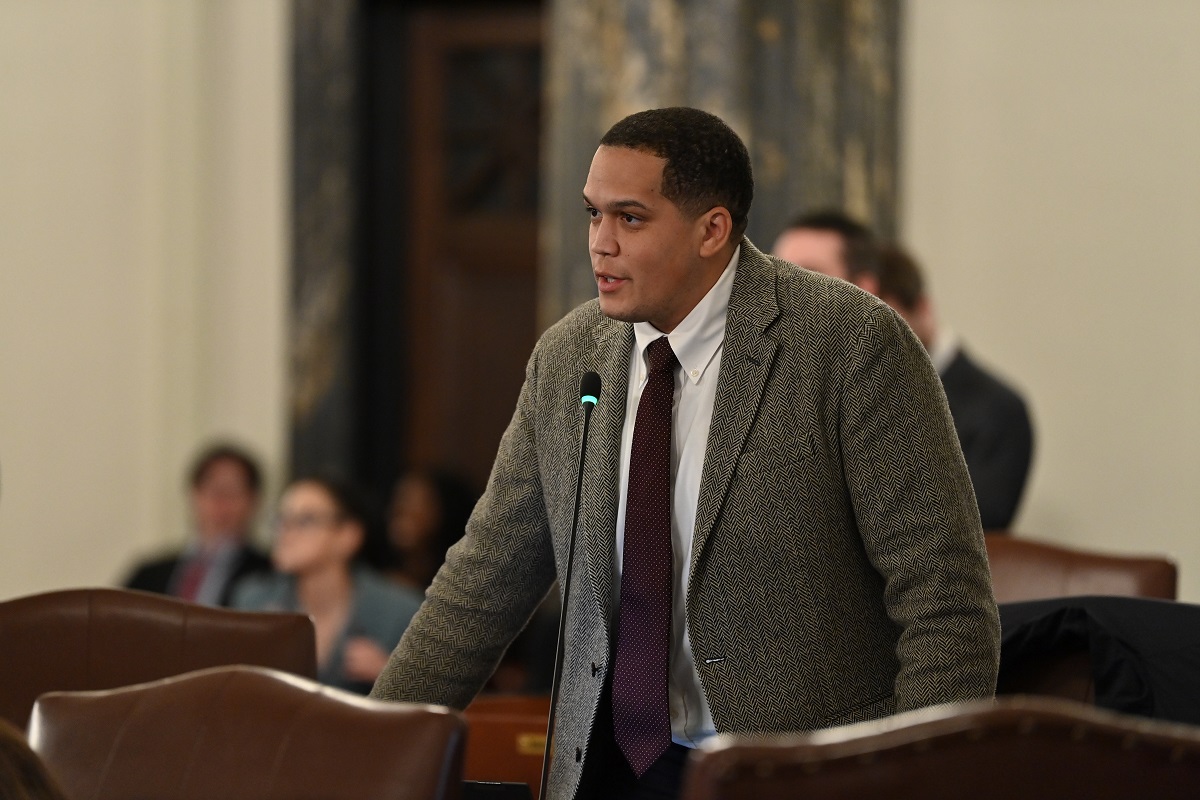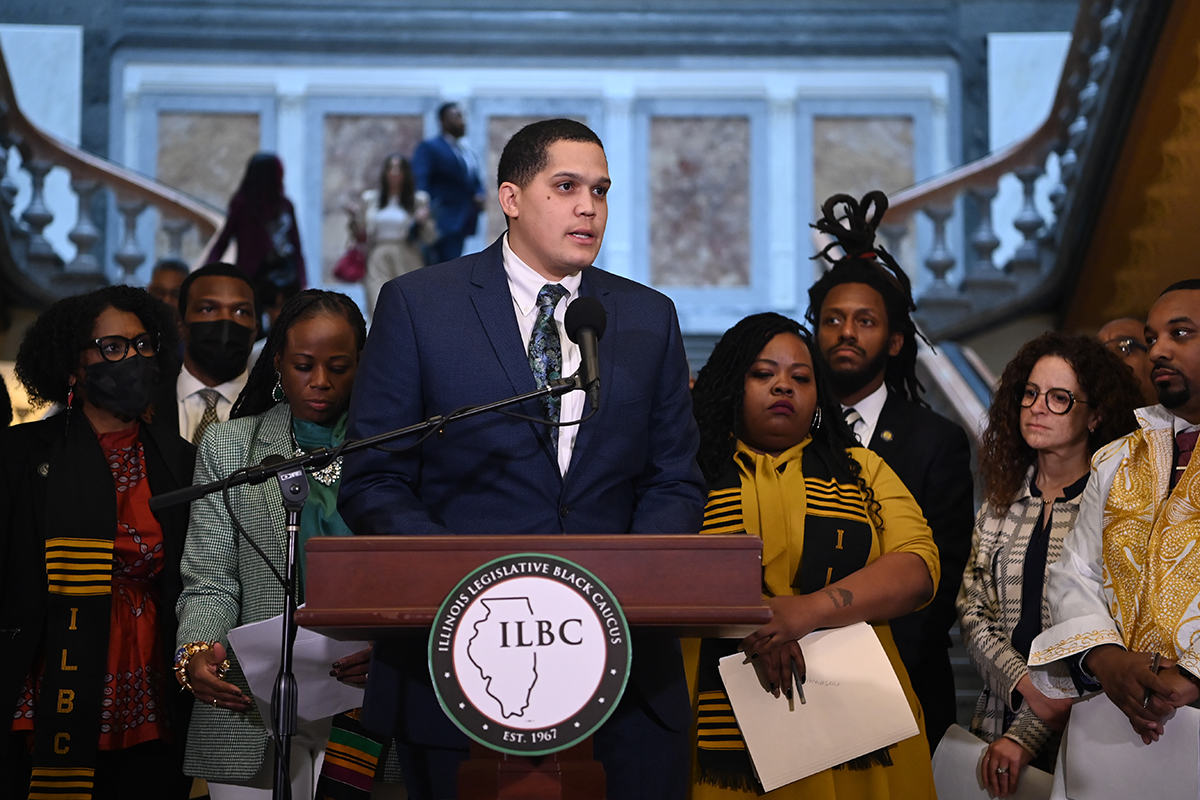- Details
- Category: Press Releases
 SPRINGFIELD — A measure championed by State Senator Robert Peters aims to shed light on the use of restrictive housing, requiring the Illinois Department of Corrections to collect and publicly share data on how often and why people are placed in solitary confinement.
SPRINGFIELD — A measure championed by State Senator Robert Peters aims to shed light on the use of restrictive housing, requiring the Illinois Department of Corrections to collect and publicly share data on how often and why people are placed in solitary confinement.
“Transparency is the foundation of accountability,” said Peters (D-Chicago). “By becoming more informed on how restrictive housing is used, we can ensure the system treats individuals fairly and humanely while holding our institutions to the highest standard of oversight.”
“Restrictive housing” is another phrase for solitary confinement – a form of housing that separates an individual in custody from the general population. The bill responds to growing concerns about the lack of publicly available data on solitary confinement practices in state facilities. Recent surveys conducted by the John Howard Association found that 42% of incarcerated individuals reported spending excess time in their cells, often not meeting the daily required minimum of two hours outside their sleeping area.
Read more: Peters measure to increase transparency in solitary confinement practices passes Senate
- Details
- Category: Press Releases
 SPRINGFIELD — To support the preservation of Promontory Point, a historic landmark in Burnham Park, State Senator Robert Peters passed a resolution which aims to restore and protect the Point’s historic limestone retaining wall while ensuring public access and ecological sustainability.
SPRINGFIELD — To support the preservation of Promontory Point, a historic landmark in Burnham Park, State Senator Robert Peters passed a resolution which aims to restore and protect the Point’s historic limestone retaining wall while ensuring public access and ecological sustainability.
“Promontory Point is a valued piece of Chicago’s history and an important public space for residents and visitors alike,” said Peters (D-Chicago). “This resolution reflects our commitment to preserving its character while addressing shoreline erosion in a way that respects the community’s voice.”
Promontory Point is a 40-acre, man-made peninsula located at the south end of Burnham Park. Listed on the National Register of Historic Places in 2018 and designated a Chicago landmark in 2023, the Point has long been at the center of preservation conversations. A 2002 proposal from the city of Chicago and the Chicago Park District sought to replace its historic limestone components with concrete and stone, sparking community opposition.
- Details
- Category: Press Releases
 SPRINGFIELD – State Senator Robert Peters (D-Chicago), Senate chair of the Illinois Legislative Black Caucus, issued the following statement in response to hateful, racist text messages targeting Black Americans in Illinois:
SPRINGFIELD – State Senator Robert Peters (D-Chicago), Senate chair of the Illinois Legislative Black Caucus, issued the following statement in response to hateful, racist text messages targeting Black Americans in Illinois:
“The Illinois Legislative Black Caucus is deeply alarmed by the recent reports of racist text messages targeting Black Americans in Illinois and across the nation. These messages, part of a disturbing and growing nationwide trend, are a direct attack on the dignity and humanity of Black people and all marginalized communities. We stand in solidarity with those affected.
“We are particularly concerned about the impact on young people — students who should be able to thrive in educational settings without the threat of racial harassment. Racism, in any form, has no place in Illinois or anywhere else in the United States. It is our collective responsibility to ensure that all individuals, regardless of their background, can live, learn and work in environments free from fear and intimidation. We will continue to advocate for policies that protect all Illinoisans from discrimination, hate and violence, working toward a future where everyone can live and grow without fear.”
The Illinois Legislative Black Caucus strongly urges anyone who has received these messages to report them to local law enforcement and the Attorney General's office through the Help Stop Hate Helpline at 877-458-4283.
- Details
- Category: Press Releases
 CHICAGO — State Senator Robert Peters recently announced that a total of $70,500 has been granted to Family Legacy Foundation’s Adult Volunteer Literacy Program.
CHICAGO — State Senator Robert Peters recently announced that a total of $70,500 has been granted to Family Legacy Foundation’s Adult Volunteer Literacy Program.
“Promoting basic literacy skills is one of the most powerful ways we can uplift our community and prepare residents for success,” said Peters (D-Chicago). “This grant will directly impact those who need these resources most, providing them with the skills they need to thrive.”
The grants were awarded by Illinois Secretary of State and State Librarian Alexi Giannoulias, who has awarded nearly $22 million for library services and $6 million for literacy programs throughout the state.
Read more: Peters commends over $70,000 for Family Legacy Foundation literacy program
More Articles …
Page 16 of 85




